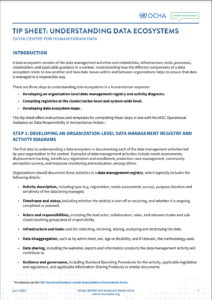 A data ecosystem consists of the data management activities and related data, infrastructure, tools, processes, stakeholders and applicable guidance in a context. Understanding how the different components of a data ecosystem relate to one another and how data moves within and between organizations helps to ensure that data is managed in a responsible way. Furthermore, the development of data management registries, diagrams and data ecosystem maps improves the transparency of data management in humanitarian response.
A data ecosystem consists of the data management activities and related data, infrastructure, tools, processes, stakeholders and applicable guidance in a context. Understanding how the different components of a data ecosystem relate to one another and how data moves within and between organizations helps to ensure that data is managed in a responsible way. Furthermore, the development of data management registries, diagrams and data ecosystem maps improves the transparency of data management in humanitarian response.
There are three steps to understanding data ecosystems in a humanitarian response:
This tip sheet offers instructions and templates for completing these steps in line with the IASC Operational
Guidance on Data Responsibility in Humanitarian Action. Following the three steps presented in this tip sheet can lead to a better understanding of the actors, data flows and opportunities for improving data management across a data
ecosystem. JIPS and the OCHA Centre for Humanitarian Data are both available to support organizations
interested in developing these outputs.